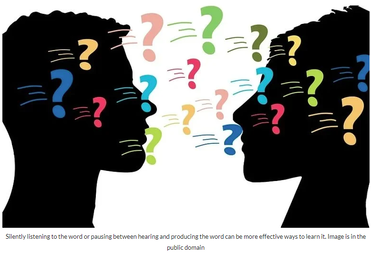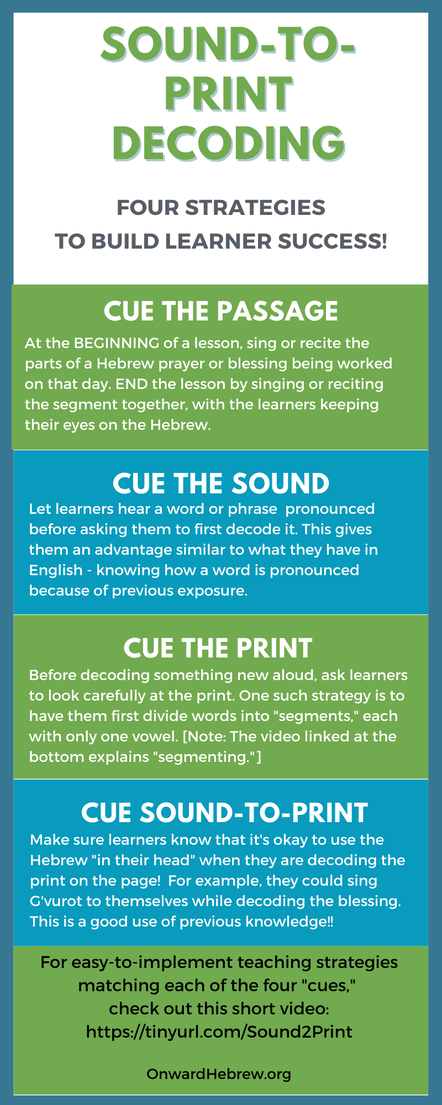 For decades, teachers have been told that students produce better answers when the teacher asks a question and then waits 3 seconds before asking a clarifying question or saying something else. The 3 seconds of "wait-time" gives learners time to process their thinking and produce a response. But here's another application of wait-time ... I just read a recently published study that reports on the importance of having students learning new vocabulary wait 2-4 seconds before repeating a new word aloud. And why? “When a person repeats a word immediately after hearing it, cognitive resources are dedicated to preparing the production of the word and, as a result, these resources cannot be used to deeply encode that word. In contrast, if production is delayed for a few seconds, this overlap is avoided, allowing deeper learning and encoding to take place." So, I'm wondering a couple of things related to #OnwardHebrew:
I don't have answers to these two questions (nor do I know what this 2-4 second wait time would look like for the decoding process), but maybe someone would find this interesting to explore in their teaching. If you do, let us know what you discover via the #OnwardHebrew Facebook group! Nachama Skolnik Moskowitz
0 Comments
 I'm not sure where the phrase "breaking teeth" originated, but it has been used to describe the painful process of decoding, letter-by-letter. For decades, when new Hebrew learners (whether children or adults) have been asked to read aloud and the process is usually very very slow and laborious - they "break their teeth." But, of course, I'm here to tell you that there's a better way! At the foundation of sound-to-print learning is the principle that people need to know the sounds of a language prior to tackling the print. For #OnwardHebrew, on a macro level that includes being introduced to Hebrew Through Movement, Jewish Life Vocabulary and regular t'fillah. However, on a micro level, when working on decoding, learners can be given cues that preview the sounds for them. Why? It offers them some of the tools that they automatically have gained in their native language. Our Hebrew prayers, blessings, and texts like Torah and Haftarah were written 2000 years ago. The complex language and grammatical forms are difficult even for Hebrew native language speakers. Our new learners are at an even bigger disadvantage since they can't self-correct when decoding - think about the challenge when they see unfamiliar words like: וְשנַּנְתָּם לְבָנֶיךָ. So, instead of asking students to "sound out" a Hebrew word or phrase, we help them tremendously when we "cue" them in the four ways noted on the embedded image. How can teachers learn to do this? 1) Share and discuss this short video that explains easy-to-implement "cueing up" teaching strategies: tinyurl.com/Sound2Print. 2) Offer copies of the "four strategies" image. Right click on it and either download ("Save As") or Copy. Then, paste the image into a document and print for easy reference. Alternatively, check the "Files" in the #OnwardHebrew Facebook group for a downloadable copy of higher resolution. 3) Experiment with the "cues" and have conversations with colleagues to tweak your practice! Questions or comments? Please share them on the #OnwardHebrew Facebook group.  #OnwardHebrew just published a very helpful (and relatively concise!) getting started booklet that offers assistance to educational leaders looking to adopt/adapt the sound-to-print principles of #OnwardHebrew in their educational program. The booklet answers such questions as:
In addition, there are What-Why-When-Who quick peeks offered for each of the four elements of #OnwardHebrew - Hebrew language (Hebrew Through Movement), Jewish Life Vocabulary, Hebrew t'fillah and the introduction of decoding after children have built the sounds of Hebrew (for "in" programs, that is in fifth grade or later). Interspersed are QR codes with links to short videos that provide extra information. And, as if that's not enough, there's a curated set of other resources - just enough to get an education program started, without being overwhelming. So, what do YOU want to know? |
AuthorSAll of us! If you have something to contribute, send your posting via the Contact webpage! Archives
September 2023
Categories
All
|
 RSS Feed
RSS Feed